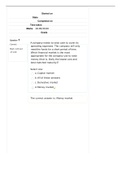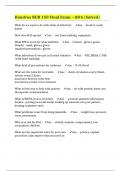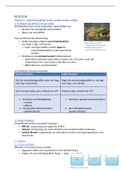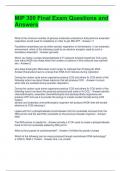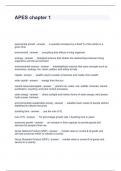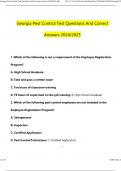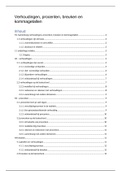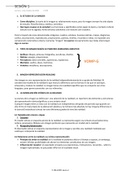Title: Macbeth: The Tragic Journey of Ambition and Guilt
Shakespeare's renowned play, Macbeth, delves into the tragic tale of a noble warrior
who succumbs to the temptation of power, ultimately leading to his demise. Set in
medieval Scotland, Macbeth's vaulting ambition drives him to commit unspeakable
acts, shattering his moral compass and unleashing a chain of events that spiral out of
control. This essay will explore the themes of ambition, guilt, and the supernatural in
Macbeth, highlighting key quotes that illuminate the protagonist's tragic journey.
Ambition's Allure and Its Consequences: From the very beginning, Macbeth's ambition
takes center stage, enticing him with the promise of greatness. His encounter with the
three witches sets the wheels of fate in motion, as they prophesy his rise to power: "All
hail, Macbeth, thou shalt be king hereafter!" (Act 1, Scene 3). These words spark an
insatiable hunger within Macbeth, igniting a relentless pursuit of power that consumes
his every thought.
As the play progresses, Macbeth's ambition becomes his downfall. He succumbs to his
wife's persuasion and plots the murder of King Duncan, defying his own conscience: "I
have no spur to prick the sides of my intent, but only vaulting ambition" (Act 1, Scene 7).
This quote exposes the driving force behind Macbeth's actions, highlighting the perilous
nature of unchecked ambition.
Guilt and Remorse as Haunting Consequences: With each vile deed committed,
Macbeth's guilt intensifies, plaguing his mind and distorting his perception of reality.
After killing Duncan, he is tormented by his conscience: "Will all great Neptune's ocean
wash this blood clean from my hand?" (Act 2, Scene 2). This evocative quote captures
Macbeth's overwhelming remorse and the realization that he can never wash away the
stain of his guilt.
The supernatural elements in the play amplify Macbeth's guilt, blurring the line between
illusion and reality. The ghost of Banquo, a victim of Macbeth's treachery, haunts him
during a banquet, exposing his inner turmoil: "Thou canst not say I did it. Never shake
thy gory locks at me!" (Act 3, Scene 4). This supernatural manifestation serves as a
chilling reminder of Macbeth's heinous acts, further fueling his descent into madness.
The Influence of the Supernatural: Throughout Macbeth, the supernatural plays a
significant role, tempting and manipulating the protagonist. The witches' prophecies act
as catalysts for Macbeth's ambition, blinding him to the consequences of his actions.
When he seeks the witches' counsel again, they conjure apparitions that deceive him
with half-truths: "Macbeth shall never vanquished be until Great Birnam Wood to high
Dunsinane Hill shall come against him" (Act 4, Scene 1). These misleading predictions
fuel Macbeth's false sense of invincibility, ultimately leading to his downfall.
Shakespeare's renowned play, Macbeth, delves into the tragic tale of a noble warrior
who succumbs to the temptation of power, ultimately leading to his demise. Set in
medieval Scotland, Macbeth's vaulting ambition drives him to commit unspeakable
acts, shattering his moral compass and unleashing a chain of events that spiral out of
control. This essay will explore the themes of ambition, guilt, and the supernatural in
Macbeth, highlighting key quotes that illuminate the protagonist's tragic journey.
Ambition's Allure and Its Consequences: From the very beginning, Macbeth's ambition
takes center stage, enticing him with the promise of greatness. His encounter with the
three witches sets the wheels of fate in motion, as they prophesy his rise to power: "All
hail, Macbeth, thou shalt be king hereafter!" (Act 1, Scene 3). These words spark an
insatiable hunger within Macbeth, igniting a relentless pursuit of power that consumes
his every thought.
As the play progresses, Macbeth's ambition becomes his downfall. He succumbs to his
wife's persuasion and plots the murder of King Duncan, defying his own conscience: "I
have no spur to prick the sides of my intent, but only vaulting ambition" (Act 1, Scene 7).
This quote exposes the driving force behind Macbeth's actions, highlighting the perilous
nature of unchecked ambition.
Guilt and Remorse as Haunting Consequences: With each vile deed committed,
Macbeth's guilt intensifies, plaguing his mind and distorting his perception of reality.
After killing Duncan, he is tormented by his conscience: "Will all great Neptune's ocean
wash this blood clean from my hand?" (Act 2, Scene 2). This evocative quote captures
Macbeth's overwhelming remorse and the realization that he can never wash away the
stain of his guilt.
The supernatural elements in the play amplify Macbeth's guilt, blurring the line between
illusion and reality. The ghost of Banquo, a victim of Macbeth's treachery, haunts him
during a banquet, exposing his inner turmoil: "Thou canst not say I did it. Never shake
thy gory locks at me!" (Act 3, Scene 4). This supernatural manifestation serves as a
chilling reminder of Macbeth's heinous acts, further fueling his descent into madness.
The Influence of the Supernatural: Throughout Macbeth, the supernatural plays a
significant role, tempting and manipulating the protagonist. The witches' prophecies act
as catalysts for Macbeth's ambition, blinding him to the consequences of his actions.
When he seeks the witches' counsel again, they conjure apparitions that deceive him
with half-truths: "Macbeth shall never vanquished be until Great Birnam Wood to high
Dunsinane Hill shall come against him" (Act 4, Scene 1). These misleading predictions
fuel Macbeth's false sense of invincibility, ultimately leading to his downfall.

